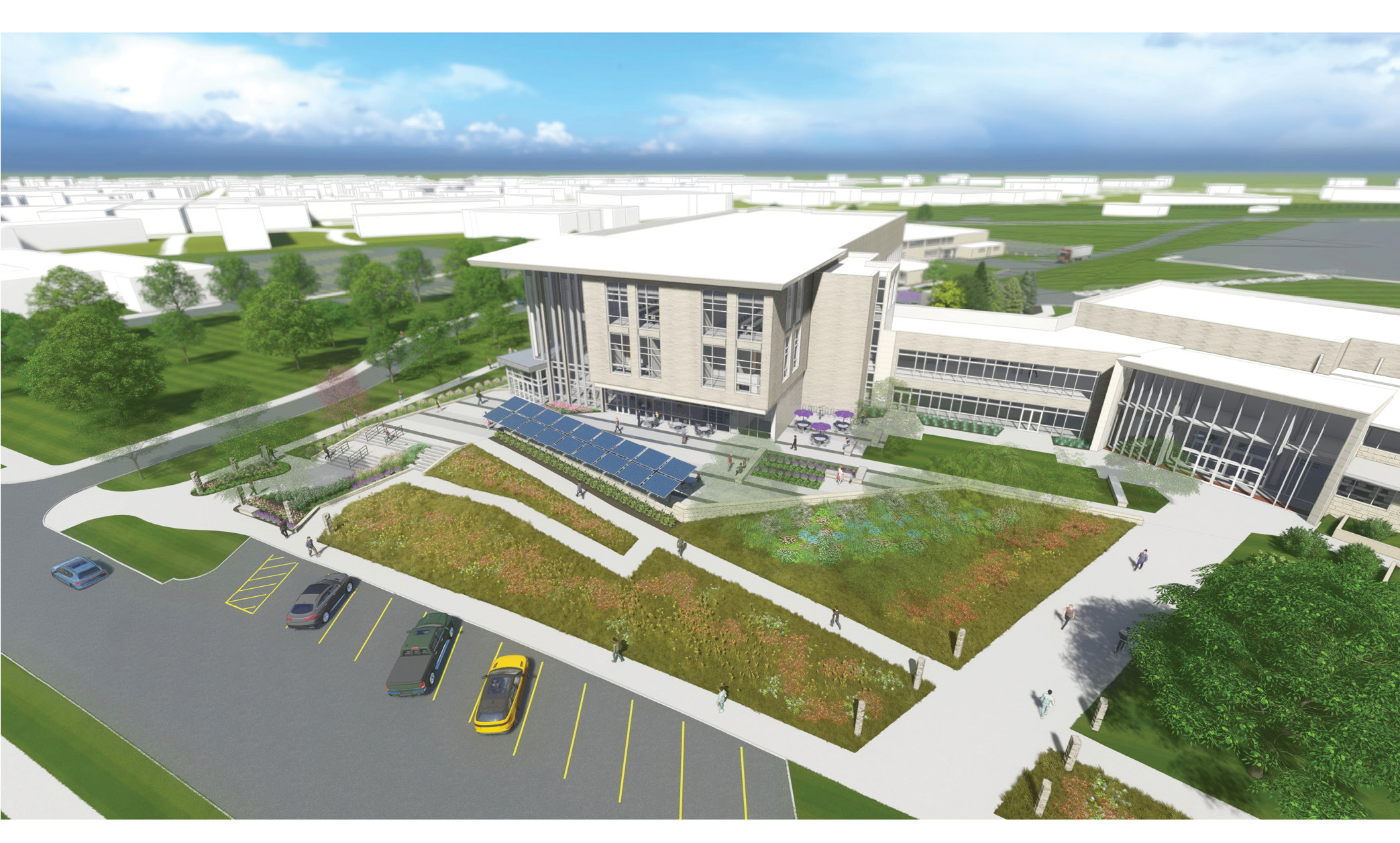A recent study found that the nation’s agricultural colleges need infrastructure upgrades totaling in the neighborhood of $11 billion. Kansas State University is rising to the challenge through a newly launched Agriculture Innovation Initiative, a project that’s primed to deliver more than $200 million of physical improvements to the university’s College of Agriculture, already ranked No. 6 in the nation by niche.com.
“It’s pretty widely accepted,” says Ernie Minton, the agriculture college’s dean, “that food security is national security, and that’s part of the background of the Agriculture Innovation Initiative.”
Minton says that by the end of 2024, construction will have begun in earnest on the three major physical components of the initiative: K-State’s new Agronomy Reseach and Innovation Center, Animal Science Arena and Global Center for Grain and Food Innovation. The new facilities, officials say, are part of a broader effort to expand collaboration among university scientists and to engage more deeply with industry partners and even the public.
Kansas State President Richard Linton, says Minton, has been a driving force behind the Agriculture Innovation Initiative. At about the time Linton took office in early 2022, the Kansas Legislature made available $25 million for what would, in fairly short order, become a project to transform the KSU College of Agriculture.
A fast-to-order fundraising campaign seized commitments totaling $75 million under an imposing deadline and thus leveraged an additional $25 million in state support, seeding the nascent project with $125 million.
“The response among donors,” says Minton, “has been exceptional. Folks have been extraordinarily generous with their resources.”
Colorado-based Ardent Mills, a world leading flour milling and ingredient company, is among those that have stepped up, having pledged $3.5 million to the initiative in November. Troy Anderson, the company’s vice president of operations, is a K-State graduate and has served for more than a decade on the College of Agriculture’s Dean’s Advisory Council.
“When President Linton came, he really made it an initiative to work with the College of Ag, work with the State of Kansas and really work with us as an alumni base to get this moving forward. Here on campus,” said Anderson in a statement, “we’ve got a nice, shiny new business building, a nice, shiny architectural building, and a nice, shiny new engineering building. We need that in the College of Agriculture.”
“… food security is national security.”
— Ernie Minton, Dean, Kansas State University College of Agriculture
The Interdisciplinary Approach
In an age where technology rules — where complex math, for example, meets agriculture — collaboration across boundaries is all the rage in academia, at least in concept. K-State’s Agriculture Innovation Initiative enshrines it in numbers. Within the Global Center for Grain and Food Innovation, says Minton, up to 30% of the new space must be dedicated to “interdisciplinary” research.
“What it means,” he explains, “is we’ll have to have faculty that are from other colleges,” including, he says, Engineering, Arts and Sciences and others, “that come over and physically occupy that space to really force interdisciplinary solutions to problems. The complex problems that are facing the Food and Ag system are going to require that breadth of thinking. That’s one thing that’s going to be unique about this building.”
In addition, says Minton, President Linton has set a mandate for 10% of the space to be available to public-private partnerships. Minton uses Hill’s Pet Food, with facilities across Kansas, as an example.
“Pet food is bigger than I even imagined before we started working with them,” says Minton, “So, if a Hill’s wants to come in, or some other company, and again work shoulder to shoulder with us, we now have space that’s dedicated for them to have laboratory space and even office space to accommodate that.”

The planned Global Center for Grain and Food Innovation at K-State.
Courtesy of Kansas State University
Minton also believes that K-State, founded in 1863 as one of the nation’s first land grant universities, is uniquely positioned to partner with food and agriculture companies.
“Land grant universities,” he says, “have the special role of extension and engagement that brings new science out into the real world.”
New Directions in Agriculture
The K-State College of Agriculture’s interdisciplinary Institute for Digital Agriculture and Advanced Analytics sets the stage for K-State to be a national leader in digital agriculture. Conceived as a “people-centered interdisciplinary collective” employing digital technologies in the service of agriculture, the institute is to focus on developing analytical methods and digital technologies, including sensors, automation and robots, to enhance food production and inform decision-making for sustainable and resilient systems.
“A next-generation land grant university is an innovative university, and that’s exactly what we’re doing with our new Institute for Digital Agriculture and Advanced Analytics,” says President Linton. “Through this new institute, Kansas State University is working across disciplines to solve global agricultural problems and build the economic prosperity of Kansas and one of our state’s key industries.”
K-State also has been at the forefront of efforts to help sustain the Ogallala Aquifer. The nation’s largest such source of underground water, the aquifer stretches more than 175,000 square miles and sustains farms throughout western Kansas. According to a recent report by two Kansas State University agricultural economists, it adds some $3.8 billion to western Kansas land values.
“It’s a large, substantial number, and it provides evidence of just how valuable irrigation is in western Kansas,” said Gabe Simpson, an associate professor in K-State’s Department of Agricultural Economics.
K-State’s College of Agriculture, in addition to being a partner in the state’s Water Innovation Systems and Education (WISE) program, recently hired Daran Rudnick, a highly respected academic, as the school’s director of sustainable irrigation.
“K-State,” says Minton, “is ready to plant and actually has planted a flag in the ground that says we’re going to be an absolute leader in terms of innovation when it comes to water.”

